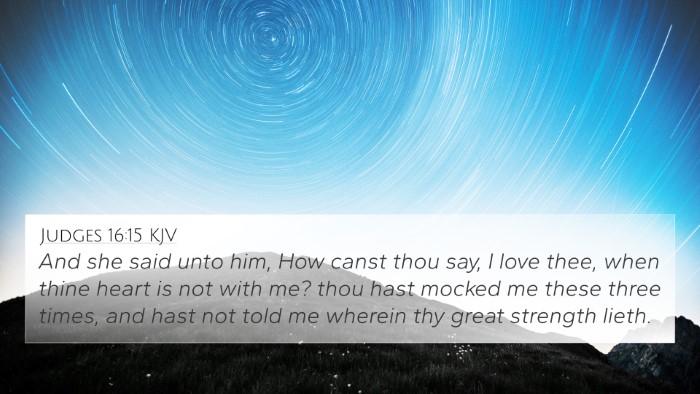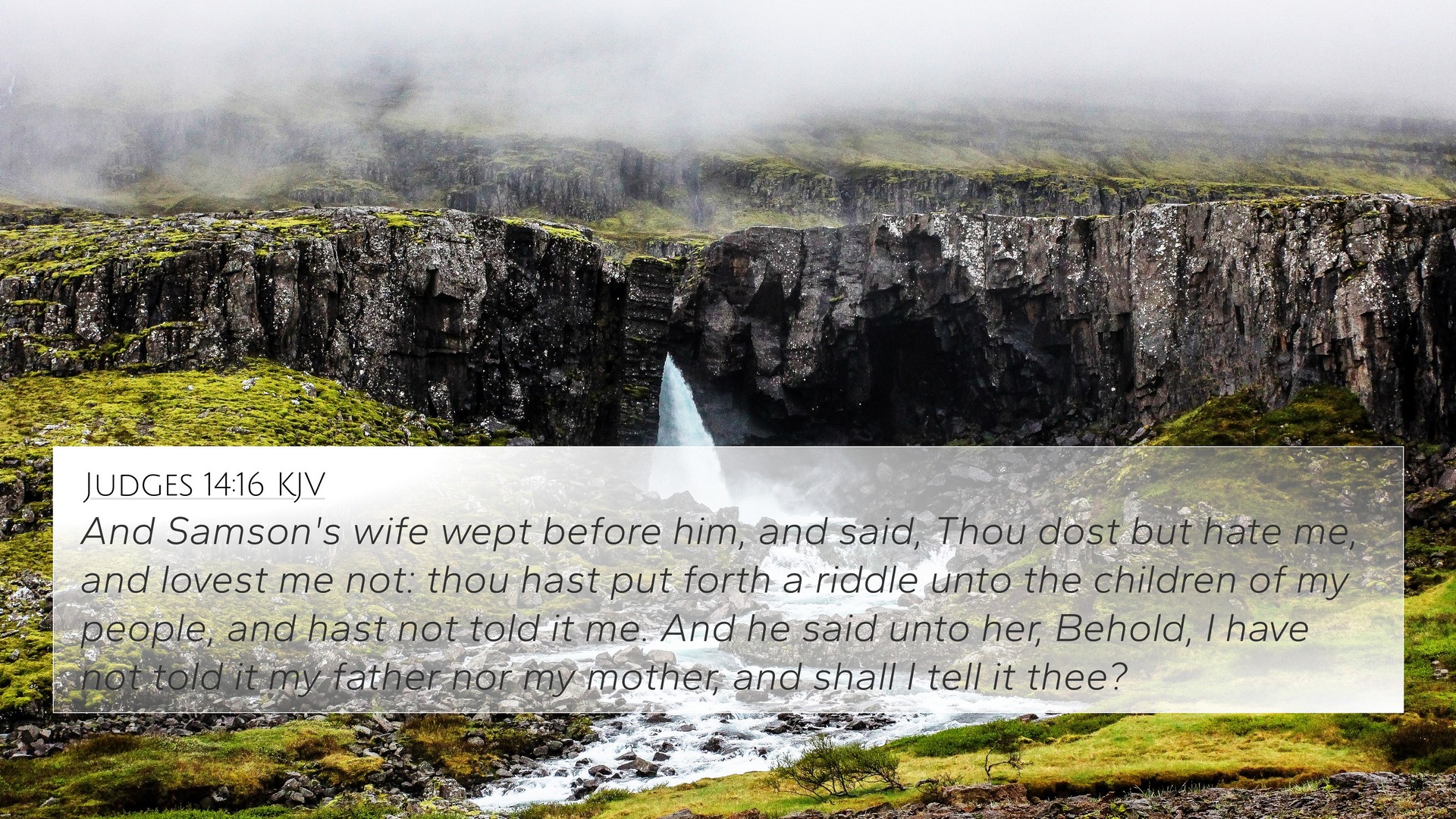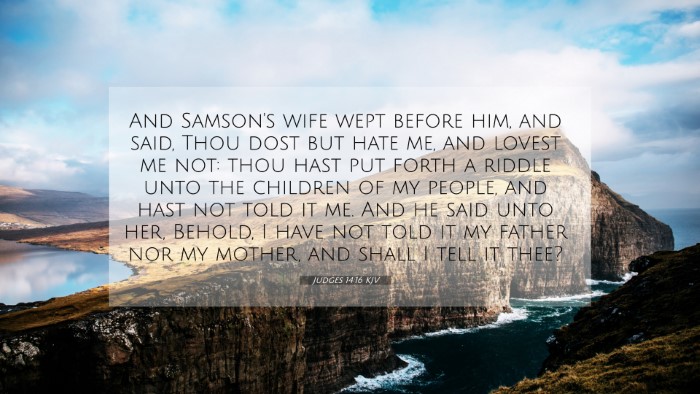Old Testament
Genesis Exodus Leviticus Numbers Deuteronomy Joshua Judges Ruth 1 Samuel 2 Samuel 1 Kings 2 Kings 1 Chronicles 2 Chronicles Ezra Nehemiah Esther Job Psalms Proverbs Ecclesiastes Song of Solomon Isaiah Jeremiah Lamentations Ezekiel Daniel Hosea Joel Amos Obadiah Jonah Micah Nahum Habakkuk Zephaniah Haggai Zechariah MalachiJudges 14:16 Similar Verses
Judges 14:16 Cross References
And Samson's wife wept before him, and said, Thou dost but hate me, and lovest me not: thou hast put forth a riddle unto the children of my people, and hast not told it me. And he said unto her, Behold, I have not told it my father nor my mother, and shall I tell it thee?
Uncover the Rich Themes and Topics of This Bible Verse
Listed below are the Bible themes associated with Judges 14:16. We invite you to explore each theme to gain deeper insights into the Scriptures.
Judges 14:16 Cross Reference Verses
This section features a detailed cross-reference designed to enrich your understanding of the Scriptures. Below, you will find carefully selected verses that echo the themes and teachings related to Judges 14:16 KJV. Click on any image to explore detailed analyses of related Bible verses and uncover deeper theological insights.

Judges 16:15 (KJV) »
And she said unto him, How canst thou say, I love thee, when thine heart is not with me? thou hast mocked me these three times, and hast not told me wherein thy great strength lieth.

Genesis 2:24 (KJV) »
Therefore shall a man leave his father and his mother, and shall cleave unto his wife: and they shall be one flesh.
Judges 14:16 Verse Analysis and Similar Verses
Bible Verse Meaning: Judges 14:16
Judges 14:16 states, "And Samson's wife wept before him, and said, 'Thou dost but hate me, and lovest me not: thou hast put forth a riddle unto the children of my people, and hast not told it me.' And he said unto her, 'Behold, I have not told it my father nor my mother, and shall I tell it thee?'" This verse offers profound insight into the personal relationships and emotional dynamics present in the narrative of Samson.
Summary of Insights from Public Domain Commentaries
Matthew Henry's Commentary
Henry emphasizes the tension in Samson's marriage, highlighting the emotional strife and lack of communication. His remarks imply that Samson's wife feared being excluded from her husband's life, reflecting a natural human desire for intimacy and understanding. This longing is indicative of deeper relational issues stemming from Samson's enigmatic nature, as he often kept secrets, even from those closest to him.
Albert Barnes' Notes
Barnes notes that the accusations made by Samson's wife signify her feelings of rejection and her struggle with vulnerability. She interprets his riddle as a symbol of exclusion. Barnes suggests that this illustrates a misalignment between their expectations in the marital relationship, and it reveals the complexity of relationships where communication is severed.
Adam Clarke's Commentary
Clarke analyzes the context of this marital tension, linking it to the cultural expectations of women during that time. He points out that her weeping represents a profound emotional appeal for attention and affection from Samson. Clarke also brings attention to the implications of Samson's secretiveness and how it affects not just his relationship but also his role as a judge and leader.
Significant Themes in Judges 14:16
- Emotional Conflict: The verse illustrates the complexities of emotional dialogues within intimate relationships.
- Communication Breakdown: Samson's reluctance to share vital information unveils an underlying theme of poor communication.
- Expectations in Marriage: The text raises questions surrounding marital duties and the expectations each partner brings into the relationship.
Interconnectedness with Other Scriptures
This verse can be cross-referenced and linked to several other biblical texts that explore similar themes. Here are some pertinent connections:
- Genesis 2:24: The establishment of the marital bond between a man and woman signifies the foundation of intimacy.
- Proverbs 27:15: Highlights the difficulties when one partner is emotionally distant.
- 1 Peter 3:7: Encourages husbands to dwell with understanding, emphasizing the importance of communication in relationships.
- Ecclesiastes 4:9-10: "Two are better than one," suggesting the strength found in partnership.
- James 1:19: Advising on slow to speak and quick to listen, which applies to the communication dynamics in Samson's marriage.
- Song of Solomon 2:15: Analyses the need to address and overcome emotional barriers in love.
- Ephesians 5:25-33: Provides a model for marriage that includes profound respect and sacrificial love.
Thematic Bible Verse Connections
The narrative surrounding Judges 14:16 can be better understood through thematic linkages such as:
- Relationships and Trust
- Secrets and Secrets Kept
- The Role of Emotions in Decision Making
- Control and Vulnerability in Relationships
Conclusion
Judges 14:16 challenges readers to reflect on the multidimensional facets of human relationships, particularly focusing on communication, emotional intimacy, and the impact of secrecy. By understanding the emotional stakes involved, one gains insight into how such dynamics can complicate interpersonal connections. The connections drawn through verses from both the Old and New Testaments bolster a deeper understanding of the lasting themes of communication, love, and relational integrity in biblical narratives.
Tools for Further Study
For those interested in a more thorough exploration of such themes, utilizing Bible cross-reference systems and Bible concordances, as well as employing cross-referencing methods in their studies, can aid significantly in uncovering layers of meaning that might otherwise remain hidden.
Engagement with Scripture
To gain a holistic understanding, consider how Judges 14:16 and its surrounding verses interact with one another, forming a tapestry of relational lessons that echo through scripture and time.


